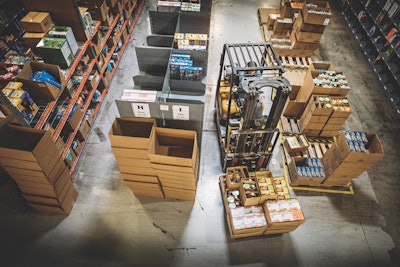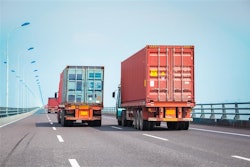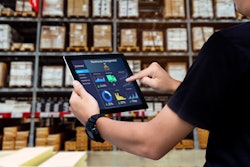
As the pressure for sustainable operations continues to be top of mind for business owners, it can be challenging for warehousing operations to find ways to balance sustainability with resiliency and productivity.
Supply chains are a significant contributor to a company’s overall carbon footprint, which is why they are looking to reduce emissions to achieve a more sustainable fleet while staying resilient when challenges strike. One way to do this is by operating clean equipment with reliable energy sources. Fortunately, propane provides a stable, cost-effective, clean energy solution that can power everything from forklifts and delivery vehicles to backup generators.
Forklifts
Propane engines have been the workhorse of the U.S. supply chain for decades, yet some professionals still doubt their versatility. Propane forklifts can be used safely both indoors and out and deliver comparable power to diesel while eliminating the need to waste time switching equipment during a shift. With fewer hydrocarbon and nitrogen oxide emissions than diesel, propane’s adaptability keeps warehouses running smoothly and cleanly.
With the “electrify everything” movement, many business owners think the solution to lower emissions is to electrify their equipment. However, they’re likely unaware that propane has a cleaner and more transparent emissions profile when lifecycle emissions are taken into consideration. This includes site-to-source emissions created during the generation and distribution of electricity, as well as the emissions produced in the production of electric batteries.
According to a recent study conducted by the Propane Education & Research Council (PERC), in most states, nitrogen oxide (NOx) emissions from propane-powered forklift engines can be less than half that of battery-electric forklifts powered by the electric grid. And because the EPA considers electric batteries a hazardous material, operators can’t simply dispose of them without severely impacting the environment.
Electric forklift batteries also wear out over time and need to be replaced multiple times throughout a forklift’s operating life, whereas a single propane cylinder can last up to 30 years with proper maintenance, regular inspection and recertification. Also, as a battery gets older, the charge doesn’t last as long, which causes forklift operators to have to stop and recharge during a shift. Or worse — if there’s a power disruption, electric forklift fleets are at the mercy of the electric grid to get back up and running. A propane cylinder, on the other hand, provides 100% power that can last an entire 8-hour shift, even during times of disruption. When the cylinder is empty, operators can simply swap it out for a full one and continue working.
Material handling operations can’t afford to waste time waiting for a charge. With propane forklifts, product can keep moving and employees can stay productive throughout an entire shift.
Power generation
The overall electrical infrastructure of the United States is rapidly aging and can be unpredictable. The supply chain doesn’t stop when the power goes out or extreme weather hits, which is why commercial propane generators are a great solution to ensure resiliency and sustainability in warehouses.
Unlike diesel which degrades over time, propane has an indefinite shelf-life, which makes it an ideal generator fuel. According to a white paper published by PERC, diesel generators produce .24 grams per kilowatt hour (g/KWh) of particulate matter (PM) and 11.65 g/KWh nitrogen oxides (NOx). Propane generators, however, only produce .03 g/KWh of PM and 1.4 g/KWh of NOx making it the clear choice to move toward achieving sustainability goals.
Commercial propane power generation can be used daily, not just for backup power, and provides uninterrupted prime power. Because propane is non-toxic, it can be stored above or below ground without risk of contaminating ground or sea water.
Last-mile delivery
Propane’s potential extends beyond operations in the warehouse. Once materials leave the distribution center, businesses can rely on propane as a clean, reliable energy source for its delivery vehicles. Propane autogas — the name for propane when it is used in a vehicle application — is ideal for medium-duty delivery fleets that need a range of up to 400 miles per day and the ability to carry a heavier payload. Today’s propane autogas engines are 90% cleaner than EPA standards and reduce NOx emissions by 96% compared to the best-in-class clean diesel engine.
Businesses looking for a sustainable fleet solution need to evaluate the site-to-source emissions of their energy source — not just what’s happening at the tailpipe. A study from PERC found that propane medium-duty vehicles (Class 3-7) provide a lower carbon footprint solution in most of the United States when compared to medium-duty EVs that are charged using the electric grid. When comparing the life-cycle equivalent carbon dioxide (CO2eq) emissions of a single medium-duty vehicle, propane autogas on a national average emits 125 tons of CO2eq less than an electric medium-duty vehicle.
Propane autogas vehicles are also more than just a sustainable solution; the portable energy source can provide a resilient option for delivery fleets. Power outages can leave electric fleets grounded and knock gasoline or diesel stations offline because they require electricity for pumping and distribution. During these disruptions, fleets that operate with propane autogas can work with their propane supplier to have a propane bobtail delivery vehicle on site to provide fuel for the fleet without the need for electricity. This ensures a sustainable supply of fuel is available at all times and vehicles are in operation during times of greatest need.
Best of all, propane suppliers can work with warehousing managers to set up a convenient on-site refueling station to keep all their propane-powered equipment running. Propane refueling infrastructure is customizable and designed to scale to easily meet the needs of any warehouse. In many cases, propane suppliers will even lease the refueling infrastructure at little to no cost to the company in exchange for a mutually beneficial fuel contract.
A cleaner future
Advancements in propane technology are making the already clean energy source even more sustainable with renewable resources. Renewable propane is a low-carbon energy source produced today from a variety of renewable feedstocks. Production of renewable propane itself is environmentally friendly, as it is a byproduct of renewable diesel and sustainable aviation fuel (SAF). The feedstocks and pathways for producing renewable propane include soybean oil, camelina plant oil, vegetable oil, animal fats or used cooking oil. Because renewable propane’s molecular structure and physical properties are the same as traditional propane, renewable propane is a “drop in” fuel for any existing propane engine, including forklifts, autogas vehicles and generators.
Warehouses around the country are already reaping the benefits of propane as a one-fuel solution to improve their sustainability and resiliency.



















